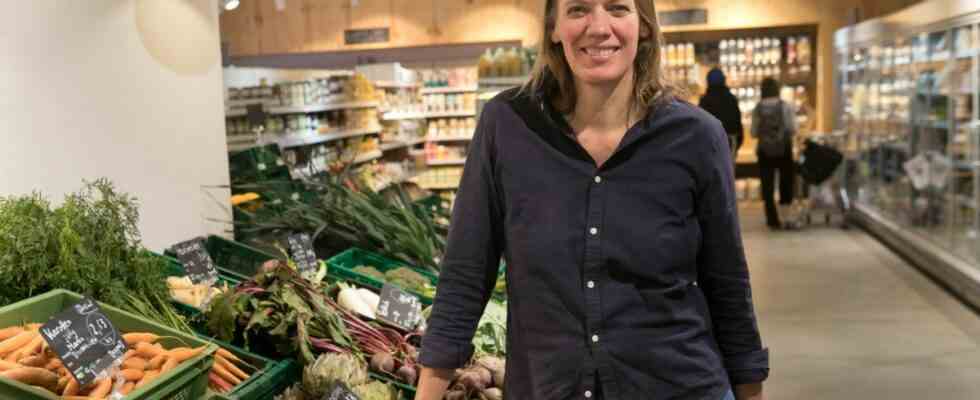Yellow zucchini, cauliflower, mini carrots here and rhubarb there. At first glance, the selection in the Foodhub in Obergiesing does not differ from other shops. Still something is missing. It takes a while to realize what: there are no advertising posters here. There are also no displays with special offers. And it’s quiet. There is no music playing in the background. What there is for this are foods that are produced under fair conditions. Only those who belong to the cooperative can buy it. The hands-on supermarket has been around for a year now. Time to see if the project works.
One person who has a lot to say about this is Kristin Mansmann. You can find her in a glass office. Slightly elevated, she can overlook the shop from here. It is reminiscent of a small control center. That’s it. The initiator coordinates the shop from here. The founding members also include Quentin Orain and Karl Schweisfurth.
It all started with the referendum on biodiversity, Mansmann recalls. That’s when the desire developed to create opportunities to shop regionally and fairly. The idea for the “joint venture” https://www.sueddeutsche.de/muenchen/ was born.
The shop wants to support regional businesses, but also buys products from large organic companies in order to have enough on offer.
(Photo: Florian Peljak)
A customer weighs his empty glass at the bulk station.
(Photo: Florian Peljak/Florian Peljak)
The concept is simple: the supermarket belongs to everyone who is a member of the cooperative. You pay a deposit of 180 euros. In addition, everyone has to work three hours once a month. On top of the price that a farmer sets for his potatoes, for example, 30 percent is added to cover costs such as the salaries of the five permanent employees. They don’t want to make a profit, “but it has to be sustainable,” says the co-initiator.
For it to do that, the community still needs to grow. When it opened there were 700 members, today there are more than 1600. The goal is 2500 members. “Then we’re in the green zone.” We are still in the start-up phase. But Mansmann doesn’t see any reason to worry: “We’re pretty much on schedule.”
The needs of the farmers are great
One of the co-owners is Lina Anbergen. A shopping basket dangles from her arm, containing a watermelon and a few strawberries. Fruit and vegetables were what brought her here in November. She wanted to shop regionally and know that the producers were well paid. “And then it felt humanly comfortable,” explains the 20-year-old.
One of the challenges of the project: “None of us are super professionals,” says Mansmann and laughs. For example, before the Foodhub, she worked as a “communications person” for law firms. But she also knows what it’s like to produce her own food. Not only did she grow up on her grandparents’ farm, she was also a beekeeper.
Despite the intention to support regional businesses, products have to be bought from larger organic companies, the 49-year-old admits: “It only works as a full range if people don’t have to go somewhere else.” After a year, one thing is definitely clear: the need among the farmers is great. While Foodhub had to actively approach them at the beginning, so many are now contacting us that it is not possible to cooperate with everyone. Mansmann says: “Actually, we could open three such markets.”
If you want to learn more about Foodhub, you can use the open day on Saturday, July 9th. From 11 a.m. onwards, members and farmers present themselves in the shop at Deisenhofenerstraße 40.

